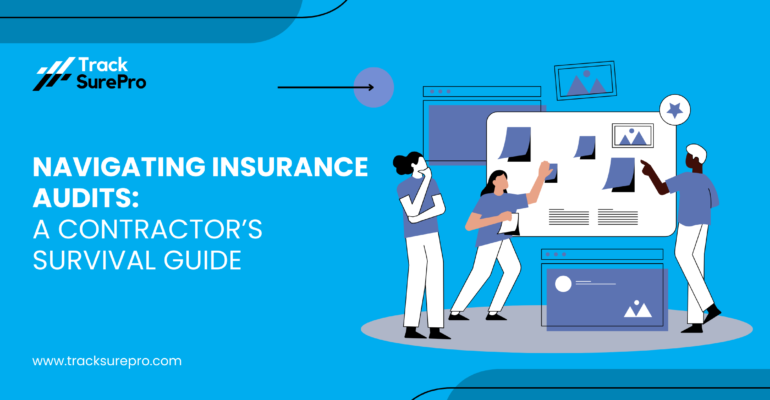Navigating Insurance Audits: A Contractor’s Survival Guide

Navigating Insurance Audits: A Contractor’s Survival Guide
Introduction:
Welcome, contractors, to your ultimate survival guide for navigating insurance audits! Insurance audits are a crucial aspect of the construction industry, ensuring that contractors maintain the necessary insurance coverage to protect their businesses and employees. However, the audit process can be complex and intimidating, often leaving contractors feeling overwhelmed and uncertain. Fear not – in this comprehensive guide, we’ll walk you through the steps to successfully navigate insurance audits with confidence. From understanding insurance requirements to preparing for the audit process, we’ll cover everything you need to know to emerge victorious. Get ready to arm yourself with knowledge and conquer insurance audits like a pro!
- Understand Insurance Requirements:
- The first step in preparing for an insurance audit is to understand the insurance requirements specific to your construction projects. Different projects may have different insurance needs, so it’s essential to familiarize yourself with the types of coverage required, such as general liability, workers’ compensation, and professional liability insurance. Review your project contracts thoroughly to identify any specific insurance obligations, and consult with insurance professionals if needed to ensure you have a clear understanding of your insurance requirements.
- Maintain Accurate Records:
- Accurate record-keeping is crucial for a successful insurance audit. Keep meticulous records of all insurance policies, certificates of insurance, and related documentation. Ensure that all policies are up to date and that you have proof of coverage for every subcontractor and vendor involved in your projects. By maintaining accurate records, you’ll be well-prepared to provide the necessary documentation during the audit process, minimizing the risk of delays or complications.
- Conduct Regular Reviews:
- Regularly reviewing your insurance policies and documentation is essential for staying on top of your insurance obligations and identifying any potential issues or gaps in coverage. Schedule regular reviews of your insurance policies, certificates of insurance, and other relevant documentation to ensure everything is in order. Look for outdated policies, expired certificates, or missing endorsements that could cause problems during an audit, and address any issues promptly to maintain compliance.
- Communicate with Subcontractors and Vendors:
- Effective communication with subcontractors and vendors is critical for ensuring insurance compliance on your projects. Clearly communicate your insurance requirements and expectations to all parties involved, and ensure they understand their obligations. Request and review certificates of insurance from subcontractors and vendors regularly to confirm compliance with insurance requirements and address any issues or discrepancies promptly. By maintaining open lines of communication, you can prevent insurance-related issues from arising and ensure smooth project operations.
- Prepare for the Audit:
- As the audit date approaches, take proactive steps to prepare yourself and your team for the audit process. Gather all necessary documentation, including insurance policies, certificates of insurance, contracts, and any other relevant paperwork. Familiarize yourself with the audit process and what to expect, and be prepared to answer any questions or provide additional information as requested by the auditor. By preparing thoroughly, you can approach the audit with confidence and ensure a smooth and successful outcome.
- Collaborate with Insurance Professionals:
- If you’re feeling overwhelmed or uncertain about the audit process, don’t hesitate to seek assistance from insurance professionals. Collaborate with insurance brokers or consultants who specialize in construction insurance to ensure you’re fully prepared for the audit. They can provide valuable insights, advice, and guidance to help you navigate the audit process with confidence, ensuring compliance with insurance requirements and minimizing the risk of issues or penalties.
- Stay Calm and Confident:
- Finally, remember to stay calm and confident throughout the audit process. Audits can be stressful, but by following these steps and being prepared, you can approach the audit with confidence knowing that you’ve done everything possible to ensure compliance with insurance requirements. Trust in your preparation and be ready to address any issues or questions that may arise during the audit. By staying calm and confident, you’ll be well-equipped to handle whatever comes your way and emerge from the audit process unscathed.
Conclusion:
In conclusion, navigating insurance audits doesn’t have to be a daunting task. By understanding insurance requirements, maintaining accurate records, conducting regular reviews, communicating effectively with subcontractors and vendors, preparing thoroughly, collaborating with insurance professionals, and staying calm and confident, you can successfully navigate insurance audits and ensure compliance with insurance requirements. Armed with the knowledge and strategies outlined in this guide, you’ll be well-equipped to tackle insurance audits and emerge victorious every time. So don’t fear the audit – embrace it as an opportunity to demonstrate your commitment to compliance and excellence in construction project management. Good luck, and happy auditing!
TrackSurePro, a cutting-edge project management software designed to streamline insurance compliance and documentation processes, offers comprehensive features to help contractors navigate insurance audits with ease. From centralized communication to automated reminders and real-time reporting, TrackSurePro empowers contractors to stay on top of their insurance requirements and ensure compliance at every step of the way. Incorporating TrackSurePro into your project management toolkit can revolutionize your approach to insurance audits, providing peace of mind and confidence in your compliance efforts.

